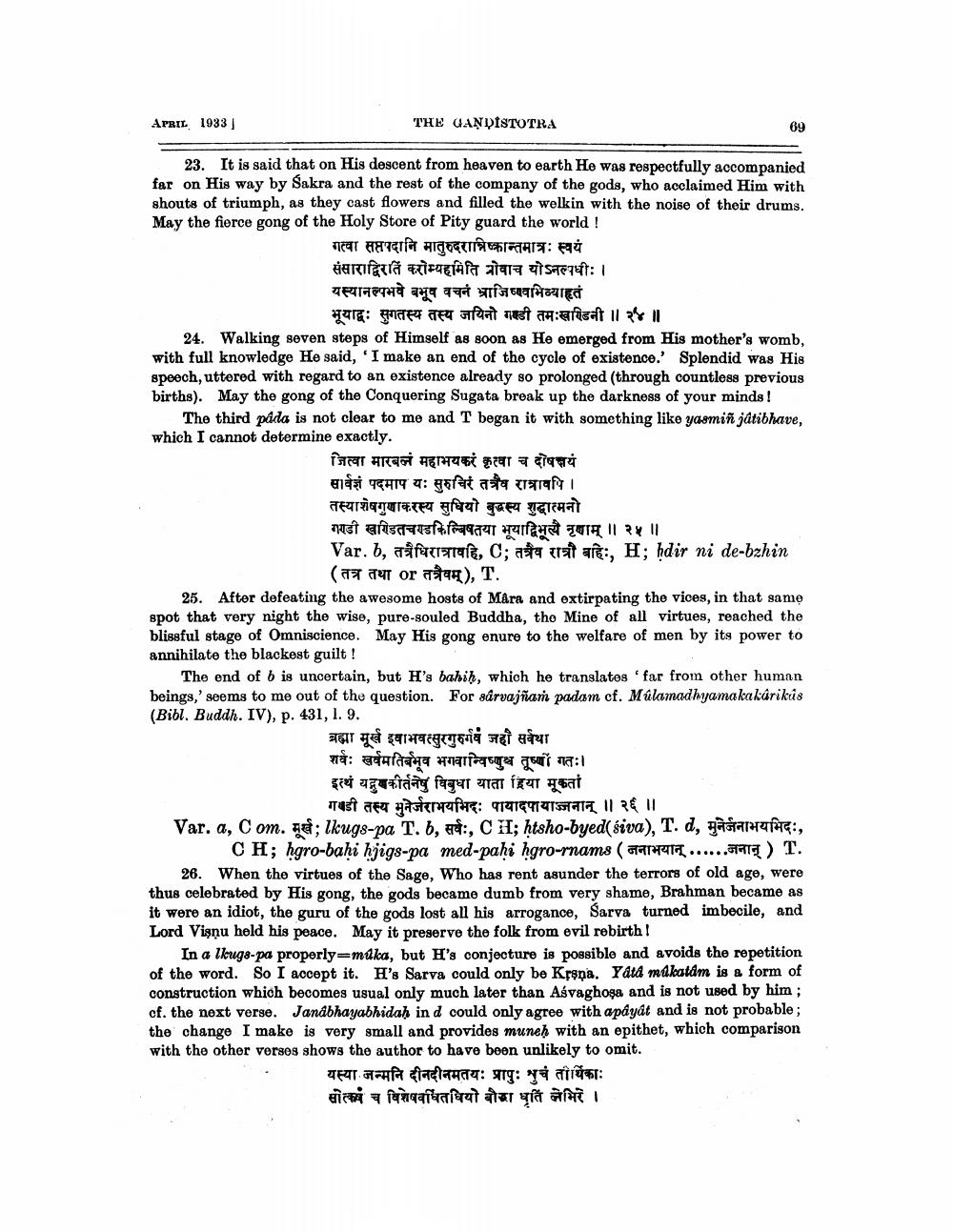________________
APRIL 19331
THE UANDISTOTRA
23. It is said that on His descent from heaven to earth He was respectfully accompanied far on His way by Sakra and the rest of the company of the gods, who acclaimed Him with shouts of triumph, as they cast flowers and filled the welkin with the noise of their drums. May the fierce gong of the Holy Store of Pity guard the world!
गत्वा सप्तपदानि मातुरुदरानिष्कान्तमात्रः स्वयं संसाराद्विरतिं करोम्यहमिति तोवाच योऽनल्पधीः । यस्यानल्पभवे बभूव वचनं भ्राजिष्यवभिव्याहृतं
भूयादः सुगतस्य तस्य जयिनो गण्डी तमःखण्डिनी ॥ २४॥ 24. Walking geven steps of Himself as soon as He emerged from His mother's womb, with full knowledge He said, 'I make an end of the cycle of existence.' Splendid was His speech, uttered with regard to an existence already so prolonged (through countless previous births). May the gong of the Conquering Sugata break up the darkness of your minds !
The third páda is not clear to me and T began it with something like yasmiñ játibhave, which I cannot determine exactly.
जित्वा मारबलं महाभयकरं कृत्वा च दोषक्षयं सार्वज्ञ पदमाप यः सुरुचिरं तत्रैव रात्रावपि । तस्याशेषगुणाकरस्य सुधियो बुद्धस्य शुद्धात्मनो गण्डी खण्डितचण्डकिल्बिषतया भूयाद्विभूत्यै नृणाम् ॥ २५ ॥ Var. b, तत्रधिरात्रावहि,C%3; तत्रैव रात्री बहिः, H; hdir ni de-bahin
(तत्र तथा or तत्रैवम् ), T.. 25. After defeating the awesome hosts of Måra and extirpating the vices, in that same spot that very night the wise, pure-souled Buddha, the Mine of all virtues, reached the blissful stage of Omniscience. May His gong enure to the welfare of men by its power to annihilate the blackest guilt !
The end of b is uncertain, but H's bahih, which he translates 'far from other human beings,' seems to me out of the question. For sårvajñam padam cf. Múlamadhyamakakúrikus (Bibl. Buddh. IV), p. 431, 1.9.
ब्रह्मा मूर्ख इवाभवत्सुरगुरुर्गव जहाँ सर्वथा शर्वः खर्वमतिर्बभूव भगवान्विष्णुश्च तूच्यों गतः। इत्थं यद्गुरकीर्तनेषु विबुधा याता हिया मूकता
गवडी तस्य मुनर्जराभयभिदः पायादपायाजनान् ॥ २६ ॥ Var.a, Com. मूर्ख; leuge-pa T.b, सर्वः, CH; htsho-byed(siva), T.d, मुनेर्जनाभयभिदः,
CH; hgro-bahi hjigs-pa med-pahi hgro-rnams (ननाभयान् ......जनान्) T. 26. When the virtues of the Sage, Who has rent asunder the terrors of old age, were thus celebrated by His gong, the gods became dumb from very shame, Brahman became as it were an idiot, the guru of the gods lost all his arrogance, Sarva turned imbecile, and Lord Vişņu held his peace. May it preserve the folk from evil rebirth!
___ Inallenge-pa properly=maka, but r's conjecture is possible and avoids the repetition of the word. So I accept it. H's Sarva could only be Kroņa. Yatd mdkatám is a form of construction which becomes usual only much later than Asvaghoşa and is not used by him ; cf. the next verse. Jandbhayabhidah in d could only agree with apayat and is not probable; the change I make is very small and provides muneh with an epithet, which comparison with the other verses shows the author to have been unlikely to omit.
यस्या जन्मनि दीनदीनमतयः प्रापुः शुचं तीर्थकाः सोत्कयं च विशेषधितधियो बौडा धृति लेभिरे ।




